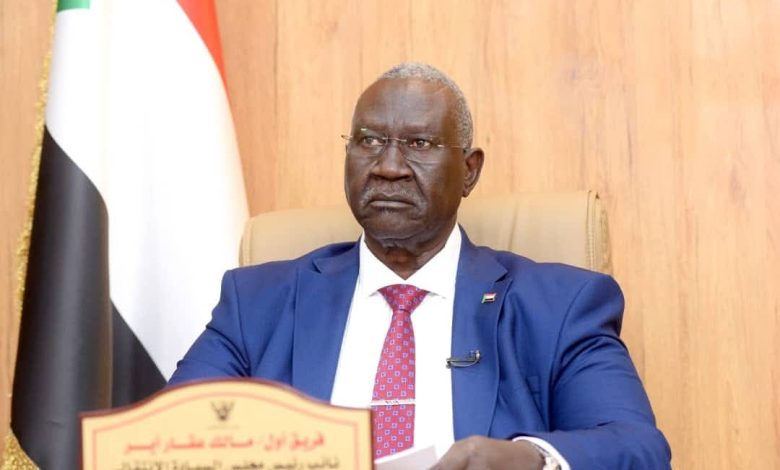Reports
An Analysis of Agar’s Speech: The Importance of Timing and the Expression of the State’s Vision

Sudan Events – Agencies
On Sunday evening, the Vice President of the Sovereign Council, Malik Agar, delivered an important speech to the Sudanese people, presenting a comprehensive vision for post-war Sudan. He covered various aspects of the country’s political, economic, and military affairs, outlining a roadmap for establishing a new Sudan based on unity, recognition, and management of diversity, free from hatred.
Victory is Imminent In his speech, the Vice President of the Sovereign Council emphasized that the Rapid Support Forces (RSF) were attempting to loot Sudan’s resources. He stated that Sudan has faced conspiracies from some misguided individuals who deviated from the revolution’s path. These individuals have been working to serve foreign agendas aimed at destroying the country. Agar confidently declared that victory was near, especially following the liberation of Wad Madani in Al-Jazeera State. He added, “I say to those involved in shedding the blood of Sudanese, you will be treated the same as your rebellious leader, Hemeti.” He further noted that the transition to democracy requires completing the liberation of all regions of the country.
Political Transition Agar also reiterated that the Sudanese army would not deviate from the political transition for which the revolutionaries sacrificed their lives. He highlighted that the rebels had planned in advance to divide and fragment Sudan, emphasizing that the army would not allow any internal or external forces to sow discord among the Sudanese people. He acknowledged that Sudan is currently not in a state of equality and is working to address this. He added, “I say to the supporters of political Islam, you must learn from the 30 years of rule,” calling for the start of a dialogue to establish a new Sudan. He continued that a consensual legitimacy must be sought to transition the country to constitutional legitimacy, stressing that the army would not accept any peace initiative that compromises Sudan’s sovereignty. He urged Sudanese political parties to play their roles and align their positions.
The Significance of Timing Agar’s speech coincided with the Sudanese army’s victories and its entry into the city of Wad Madani on Saturday. This led experts to describe the speech as a “Victory Speech,” in which he outlined the state’s plan for the post-war period. The speech also highlighted the government’s achievements in currency reforms and the successful completion of secondary school exams, raising many questions about whether the war had truly ended or was close to its conclusion. The question arises: To what extent can we consider the war almost over in Sudan, and how can we accept the parameters set by Agar regarding political consensus and the establishment of post-war Sudan?
Reservations on the Speech Some political forces in the country expressed reservations about Agar’s speech, asserting that this was not the time to talk about achievements. Several political leaders, who preferred to remain anonymous, told Al-Muhaqqiq: “We expected the speech to focus on the victory in Madani and boost the morale of the forces for further liberation of cities.” They described the speech as a general overview and implied that Agar is not the official spokesperson for the state’s vision. They suggested that Agar represents only one faction, which could create sensitivities with other political forces in the country.
The State’s Vision On the other hand, the political secretary of the Democratic Unionist Party (original) said that Agar’s speech was reasonable and reflected the Sudanese state’s vision. He stated that the Democratic Unionist Party is committed to civilian democratic transformation and accountability for those responsible for the crimes and suffering of the Sudanese people. He emphasized that justice must take its course and called for inclusivity, affirming that anyone with genuine national affiliation should have a role in the political equation. He regarded Agar’s speech as timely and reflective of the government’s achievements during the war and its handling of crises. He highlighted that the liberation of Madani is a significant hopeful sign, showing the army’s progress and the nation’s unity in a real national struggle. He affirmed that Agar’s vision is in line with the state’s vision and is a collectively agreed project, stating that they agree on the necessity of democratic transition and the unity of Sudan. He praised Agar for his role as head of the Sudan People’s Liberation Movement and his substantial contribution to the national cause.
Agreement For his part, journalist and political analyst Maki Al-Maghari emphasized that there are agreed-upon points and that there is no longer an absolute individual decision. He told Al-Muhaqqiq: “I do not consider Agar, Burhan, or any of the state’s leaders to have different visions. What happens is a difference in the level of expression between sharpness and clarity, and others who speak in a more moderate political tone. However, all of this comes from a single vision and a single decision-making center.” He added that Agar’s speech accurately reflected the state’s consensus, noting that even Agar’s criticism of what is called political Islam is more of an admonishment, reaffirming that no faction can hijack Sudan’s affairs. Al-Maghari noted that these messages are more directed at foreign audiences than at the domestic audience, as the domestic situation is already settled, and the vision is clear. He concluded that Agar’s speech aligns perfectly with the state’s actions and strategies.
Source: “Al-Muhaqqiq” website



